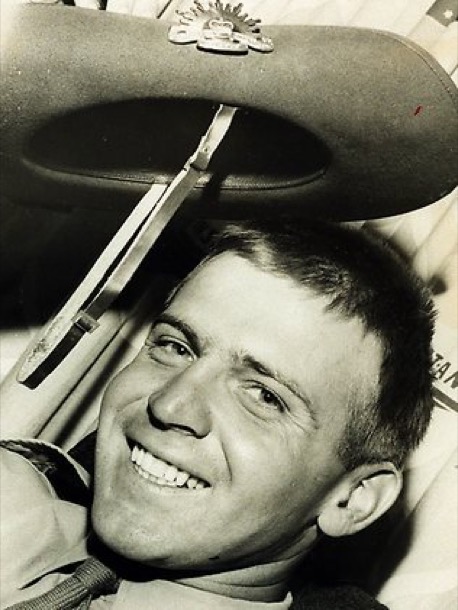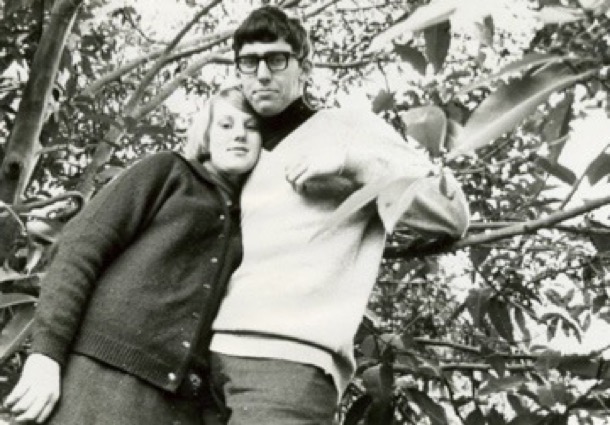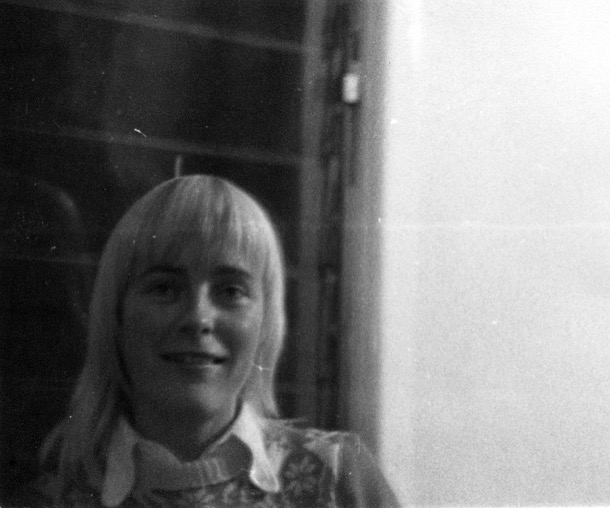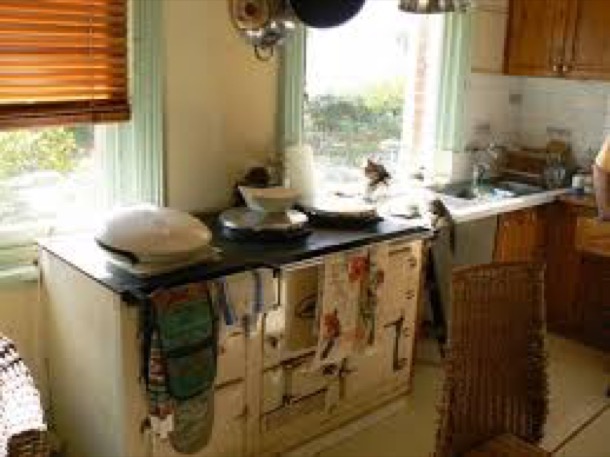Drouin Christmas, 1975
The Christmas of 1975 was a huge and exciting enterprise. Jono and I were living in a beautiful house just outside Drouin. It was the old farmhouse on a big dairy farm for which we paid the princely sum of $10 a month rent. It was the perfect venue for an Australian Christmas for Jono’s visiting Danish relatives.
Guelda, Jono's cousin had made contact with the Danish relatives before World War 2, and the families had maintained contact ever since. Eva and Harry lived in Copenhagen, and Jono and I, Anne and Janey had all stayed with them the previous year. Now it was our turn to host.
In retrospect, it was very ambitious. We had Christmas lunch to prepare for Jono's and my immediate families, Guelda and her sister Polly, the Danes and a couple of teaching friends: seventeen in all. We also had several of the party as house guests overnight, before the culmination of Boxing Day’s lunch of leftovers, and the Drouin Picnic Races. Everybody chipped in as usual and it was a great success. The whole two day event was beautifully photographed and filmed by Fred, as always. These images have recently been sent to us, as Fred goes through his archives.
Guelda, Jono’s cousin must have been in her sixties in this photograph. Always eccentric and her own person, she did not disappoint at this party. She sunbaked topless, wore wonderfully bright, way-out clothes and was the life of the party. Guelda already knew Eva and Harry quite well from her many trips to Denmark so they were very pleased to see each other.
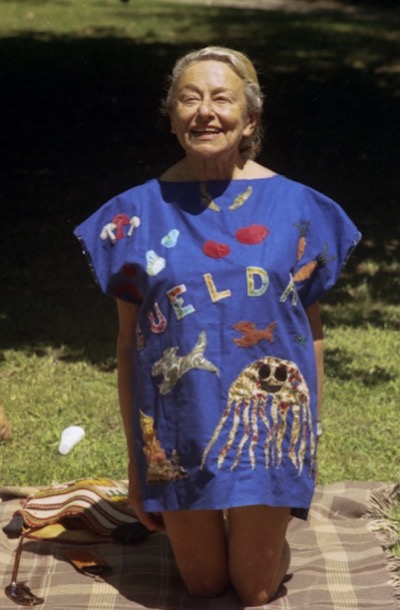
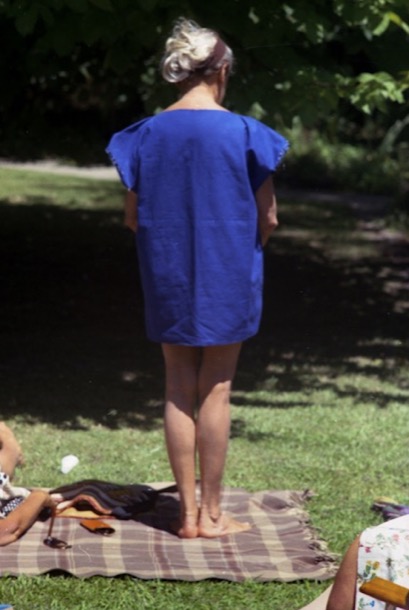
This was a lovely room with big windows opening to a verandah and a large shady Golden Elm. Jono and I painted this room to brighten it up, when we took the house. You can see on the mantlepiece some of the pots we still have, and on the chair our secondhand black and white television.
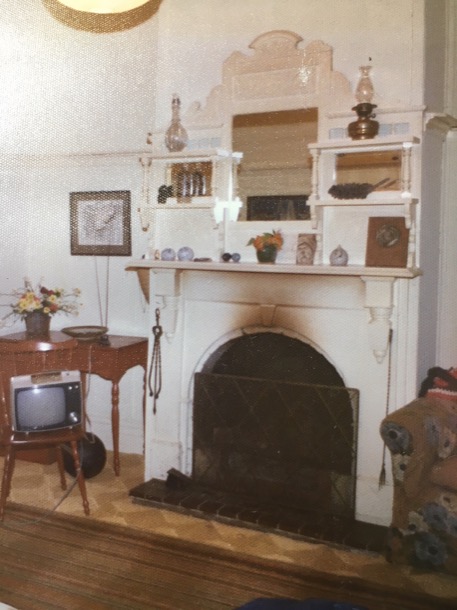
Harry and Eva married late in life and lived in an apartment in central Copenhagen. They were a couple of contrasts. Eva was an imposing, vibrant, woman with a booming deep voice and Harry was a quiet and gentle man with a weakness for Blue Castello cheese. He introduced it to us in Denmark and we have been buying it ever since.
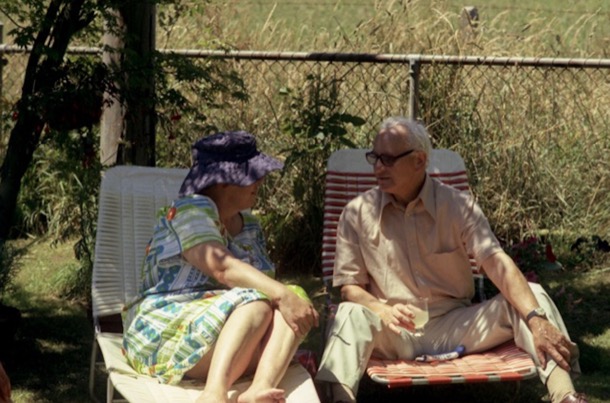
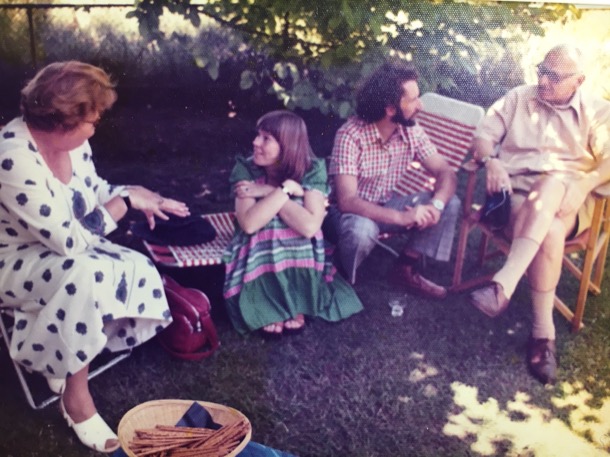
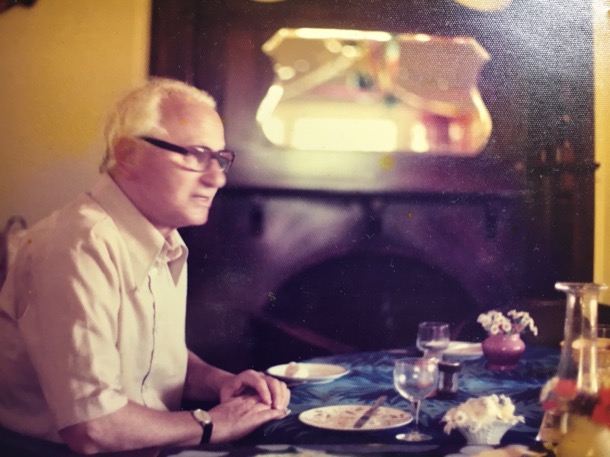
Forty-three years ago and it was a Christmas lunch we would recognise today: similar food and many of the same bowls, cutlery and crockery. Seated around the table are the extended family from both sides, the Danes and teaching friends from overseas.
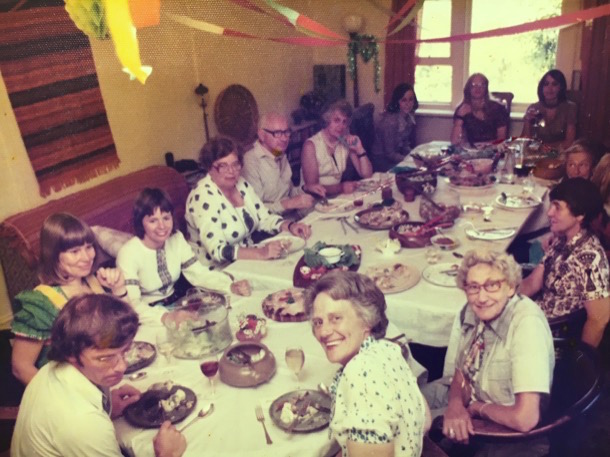
Two sisters on the verandah at Drouin on Christmas Eve. Margaret’s dog Saki is by her side and Sue is nursing Beetle or Ben.
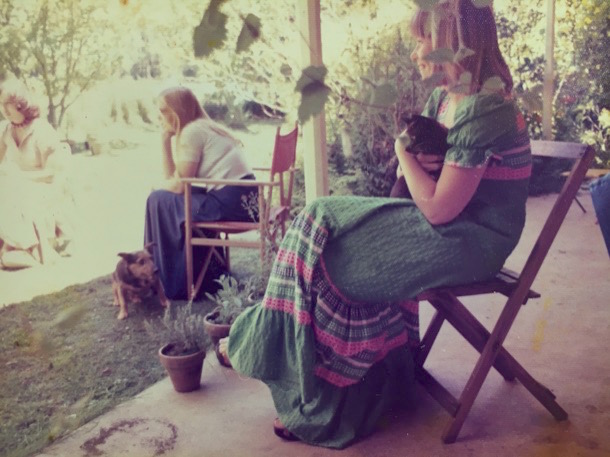
Boxing Day began wth breakfast for house guests and a picnic of leftovers at the Drouin Boxing Day Races. It was a typical hot summer day. Dry grass and eucalypts formed the background to the dusty country track, and the crowd, variously attired in summer race-wear, cheered on the horse races. The largest field in any of the races was only five horses. No fortunes were won or lost and we retired to the cool green garden for a quiet afternoon.
Poowong Footage
In 1976, close to my 25th birthday, Fred and I visited our father and his wife Bev and Bev’s two young sons, Grant and Scott, at their fairly newly acquired property, the old Poowong homestead. Fred, the chronicler of our lives, with his trusty movie camera, recorded the visit on film. Until Fred sent it to me recently, I had not remembered the visit.
The significance of this particular flickering footage of Poowong rests not only on the fact that it is forty years old, not even on the fact that 1976 was during a short window in which we had a fairly normal grown up daughter-father relationship. Its power is much more recent.
Our father died three and a half years after this film was taken in early 1980. He was not even sixty. There was a family history of heart disease, and although, there were occasional bursts of a sunny warm personality, the Jim we had known for most of our lives had been tightly coiled and tense.
As Sue and I watched this footage: our fifty-five year old father walking the paddocks: strong, handsome and happy, clearly happy, I found myself bringing up the possibility of sending this footage to that other family. They had had him for such a short time. We looked at each other in amazement. The process of exploring and exposing our own pasts in this blog, at first staying with emotionally safe pathways, then probing gently the uneven terrain of long disused dark tracks, has led us both to this place. Together we marvelled that our long held animosity and rancour, seemed to have just … dried up.
After getting Fred’s permission, and after a little internet sleuthing, I found a family contact. I sent a tentative paragraph, using Facebook Messenger, together with a link to the film. There was an immediate response.
Bev, still living in that Poowong house, was very appreciative. She said it brought back “lots of great memories”. And apparently lots of us old ladies are good internet sleuths. Bev had been following this blog all along, and she has subsequently sent us some family history booklets and photos.
The family contact I had found was Robyn, wife of Grant, one of those little boys in the film, and Grant has a very special interest in this story. By chance, I had sent the footage to the very person who had found Jim, after he had died. In Grant’s own words:
One of the reasons for our move to Poowong was the poor health of my stepfather. He had suffered a serious heart attack and had been pensioned out of the teaching service, and a less stressful lifestyle was recommended. Sadly for Jim, he would only enjoy the more sedate lifestyle for two years, as he passed away early in 1980.
… Every summer without fail, my family would join with my mother’s sister’s family in a month-long Christmas vacation at our big old (holiday) house. The summer of 1980 was no different except that, at the end of January, Jim and I returned to Poowong to attend to some work around the farm, leaving my mum and younger brother still vacationing at Inverloch.
It was one of those long daylight saving summer days and, towards the evening, Jim set off to search our boundary fence for his tobacco pouch that he had lost during the day. He had been gone for a long time and it was almost dark, so I decided to go for a walk to find him. My dog Butch led me out to the side paddock, and immediately ran to a steep incline covered in long grass, by our fence line. The world today is permeated with death, and even children as young as eleven are far too familiar with its many faces. But for me at eleven years old, death was foreign and the stuff of nightmares. To me at eleven and to me now at 44, it will always be the same - the face of a 58-year-old man drained of blood, sheer white, pale blue eyes staring up into a twilight sky. Jim died of a massive heart attack leaving me alone on the farm, waiting for mum’s ritual telephone call that night.
The details of the chaos of that night and the weeks ahead can be imagined. The trauma inflicted on our family was immeasurable, as anyone who has suffered an unexpected loss would know.
A few months after this, Grant had a life changing experience on the very spot where he had found Jim’s body.
He goes on to write, In the more than 30 years since that experience, I have had much time to reflect on what it means to me. It has given me great comfort at times and has given me an unwavering belief in the hereafter.
Inspired by this, Grant went on to investigate and research the Paranormal, travelling throughout Gippsland, interviewing people and compiling evidence on some of Gippsland’s greatest mysteries. His book, “Great Gippsland Mysteries” was published in 2014.
Fred's films
Because he was a photographer/filmmaker, Fred recorded our lives: not the special-occasion-everyone-smile-for-the-camera sort of record, but the everyday. Some of the photographs we have included in various posts have been Fred’s.
And while Sue and I have been talking, writing, blogging about our lives in these posts, so Fred, hunched over a flickering screen, sorting through dusty boxes, has been working through his own story.
So throughout this winter, we have been blessed with little visual gems from our past, some still images like the ones in this post, and others scraps of super 8 film, sometimes just for our own private viewing, and others that will be put together into something more substantial, as Fred works through his archive.
Here then, is just a taste of this rich collection. Over the next while we will put together some more detailed stories of these years.
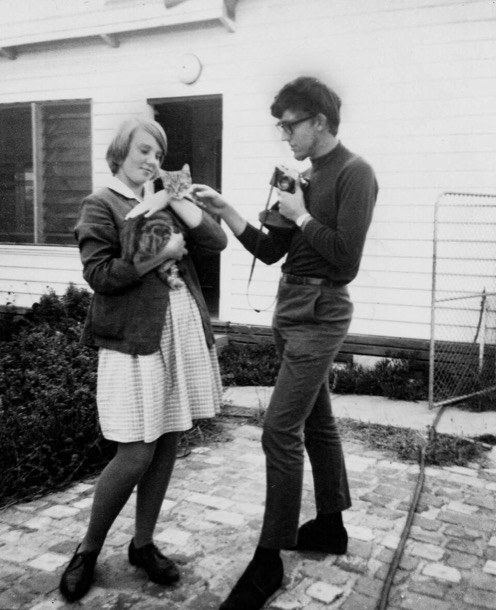
Margaret first met Fred, when he was in second year photography at RMIT and was running the Photography Club at Burwood High School, where Margaret was in Year 10. After Margaret played a part in one of the club’s movies and Fred went to the Year 10 Form Party, Margaret and Fred started ‘going out’. Fred then became an important part of our all of our lives for many years.
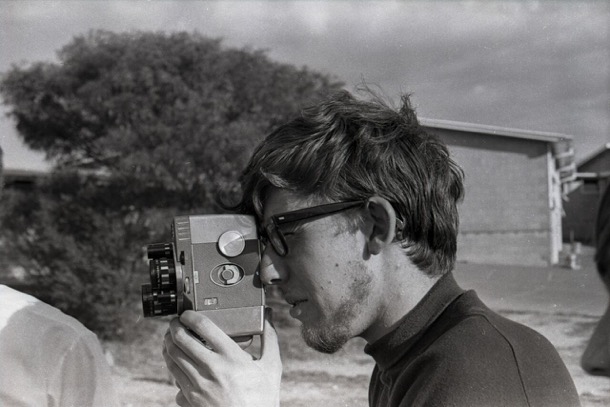
Fred, camera in hand was quite a usual pose in those days, as he recorded the minutia of our daily lives in Super 8 movie film.
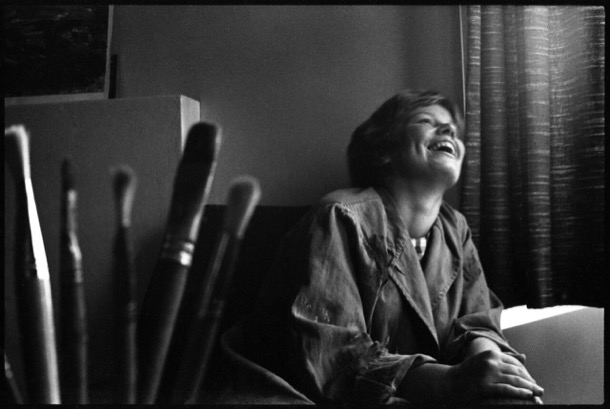
Fred also took many black and white stills with his Pentax SLR.This one is of me in first year of my Art course. I am wearing an old dust coat of Dads to paint in. Teachers in those days, particularly Science teachers, had grey dust coats to wear over their clothes as protection from both chemicals and chalk dust.
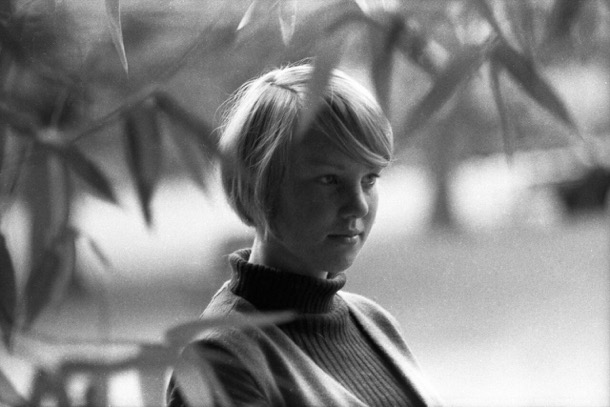
At the Botanical Gardens. Margaret about sixteen years old.
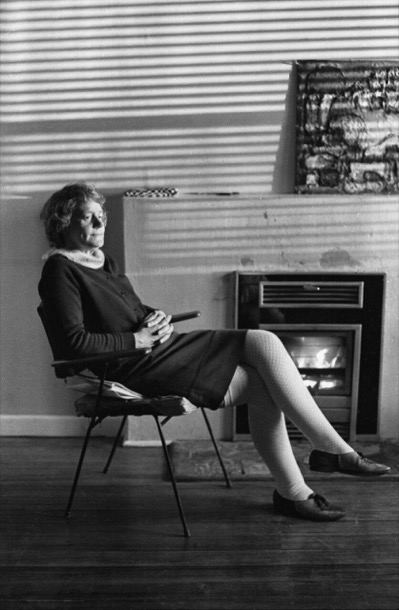
Our mother, Alice, in the lounge room at Moore Street, in about 1967. She was forty-four years old and had recently gone back to work for the first time since she was married in 1945.
When he sent these shots Fred commented, “I like it when you see your parents as young and attractive, virile. These two show a very frugal environment, with the only decoration someone’s school pencil case. If I was photographing her today, I’d automatically retouch that stocking top (and I can if you’d like) but it’s part of the reality of the time.”
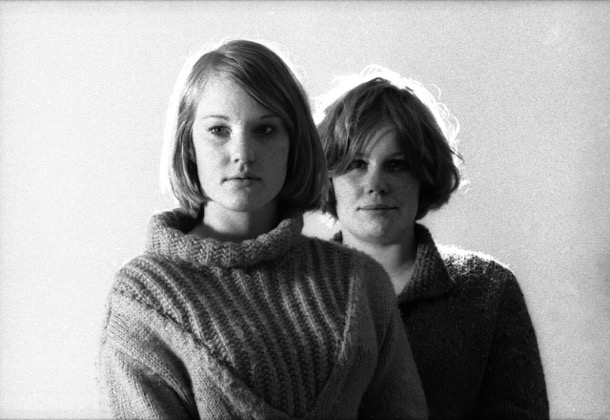
By 1968, Fred was working as a professional photographer. The Studio he shared with two other ex students from the RMIT course, was all set up with special lighting and backdrops. This shot of two sisters was taken there.
Sue, Margaret, Rikki and Fred
Susan:
The 1960s was rather a bleak period in my life. The break up of our parents’ marriage, and the aftermath, had a profound affect on many lives. For me, in the sixties, it robbed me of my adolescence, at time when one should be free to learn, gain confidence and independence and, something always close to my heart, have adventures. This unusual friendship between my sister Margaret, her boyfriend at the time Fred and another girl, Rikki, provided just that, for which I will be forever grateful.
Margaret:
Fred had been called up. He was 19. The marble with his June 5th birthday had been drawn out of the barrel. National servicemen were dying in Vietnam. Glamorous pop star Norma Rowe, whose name had been on my pencil case for a while, was the Nasho poster boy, but the black and white TV screens showed the horror of guerrilla jungle warfare, in the kind of detail that would change the coverage of war for ever. After Vietnam, governments learnt to control the footage and the access. But in Vietnam we saw it all.
The Seekers' “If you go away On this summer day Then you might as well Take the sun away….” had been all over the radio that summer. Sixteen and prone to drama, I wallowed in the emotion of my lovely boyfriend being sent to Vietnam.
Fred was sent an appointment for a medical. Luckily he failed the medical and was reprieved. Another family friend who was an offical conscientious objector had to face court, and many went to jail.
Susan:
A breath of fresh air from the outside world came rushing into my life bringing with it new books to read about sea otters in Far North Scotland and Moomins; movies; photography; Carlton; fairy toadstool rings under pine trees at the Basin and above all the magical world of the Australian High Country. Rikki had an interest in the romance of the High Country, as she loved Elyne Mitchell’s books, one of which is the classic The Silver Brumby, a favourite of children of our era. Other books written by Elyne Mitchell are also based in the High Country and tell of her early married life to Tom Mitchell who had grown up in the area.
They lived on his beautiful family property with a view of the Main Range. Here they pioneered the skiing in this area, getting to the tops by horse and pack horse and then walking up a steep ridge from Geehi carrying their skis. We too were captivated by this world.
Rikki corresponded regularly with Elyne Mitchell, who, as you can imagine, was a fascinating woman. Fred also had a connection to this area, as he had spent his childhood and adolescence near Corryong. I had been through the Snowy Mountains on a school trip and was intrigued by this new world. We were all hooked, and thus began the adventures in the mountains.
I will never forget the excitement and thrill of discovery of that first trip in Easter, 1968. We set off up the Hume on Thursday night in the car our father very kindly lent us. A little after midnight, as we drove between Tallangatta and Corryong, we were telling the current scary story of a man on the roof of the car with a severed head. It was especially scary when we stopped to have a sleep in a bus shelter by the side of the road, too tired to go on. At least we had the sense to stop, even if it was freezing, especially sleeping on a concrete floor.
We were so naive and badly equipped for our trip. We camped at Khancoban , all sleeping in the same tent, bizarre, but we only had one, and then drove up to Seaman’s Hut on the Kosciusko Road and walked across to Albina Hut.
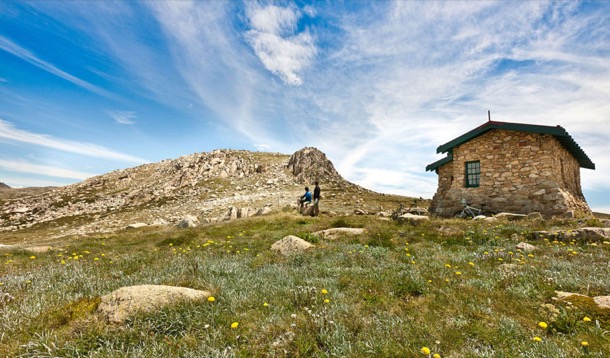
Seaman's hut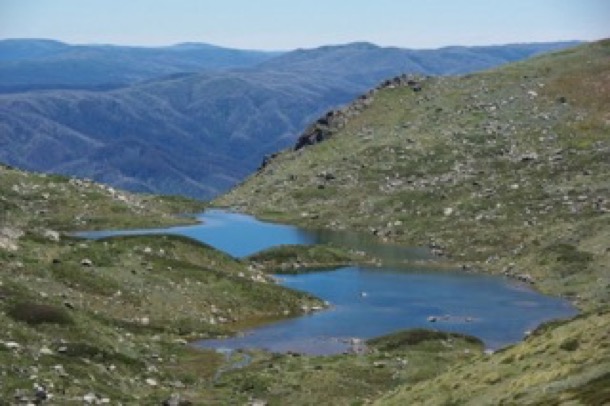
Lake Albina, viewed from Albina hut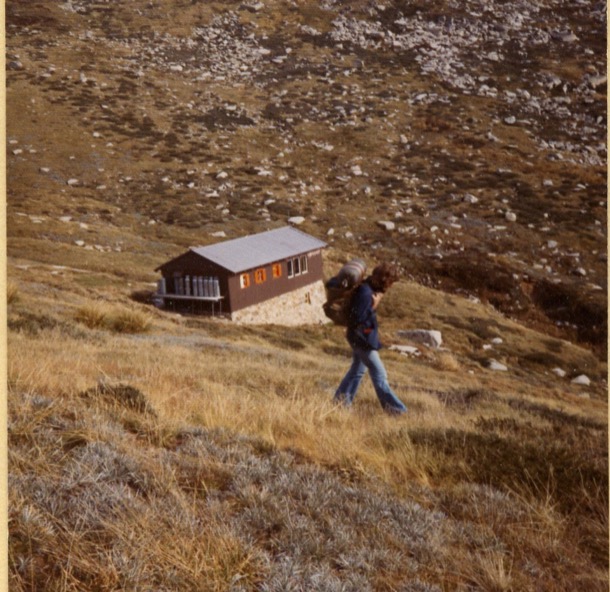
Fred, in front of Albina hut, this time with a pack.
Albina Hut is in a beautiful glacial valley just below Mt Townsend, which is only nineteen metres lower than Kosciusko. Dangerous country to walk in with no tent, no proper mountain clothes and no previous experience. Fred even carried a suitcase and an umbrella!!!! What a sight we must have been to the seasoned mountain walkers who were also staying in this hut that belonged to the Geehi Ski Club. I don’t remember anyone commenting or even warning us about the rapid weather changes.
It was fabulous. Loved every minute of the walk: the snow grass, the flowers the stunning granite tors and luckily the cobalt blue sky. My love affair with grasses began here, as did my joy of walking in the mountains.
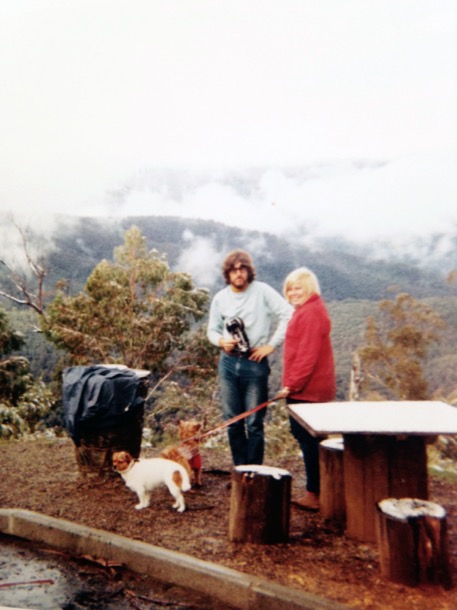
Sue and Fred in the Snowy Mountains
Margaret:
Around that time Rikki, Sue and I moved in together to the flat at the back of our parents’ house. We ate with the rest of the family, but it was a taste of independence. Sue was studying Art teaching in the city, Rikki was working full time, Fred was in his final year of Photography at RMIT and I was in my final year of school. Somehow through that year, in between weekends away and nights at the movies or out to dinner, I managed to snatch enough study time, but only just. I squirrelled myself away in Mum’s bedroom for the last couple of weeks before the exams.
That summer, after Christmas, we travelled up the Hume again, this time in Rikki’s little Volkswagen, “Greymouse”. Fred had spent his childhood living in Walwa, just over the NSW border, where his parents both worked at the Butter Factory. Family friends owned a farm that backed onto the Murray River near Corryong. Fred had spent childhood holidays exploring the river and knew of an island, reachable by car for most of the way, through the farm tracks. We lugged all our camping gear through the bush, waded over the river and set up on the island. I remember heat and flies, but also ants. We had a bush table on which the camp stove sat. Cooking required a tarp, on the ground in front of the table, wetted with river water, to keep the tiny ants from swarming up one’s legs.
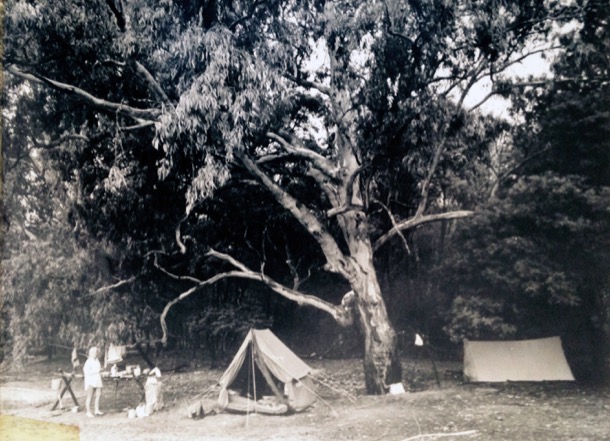
Camp on the island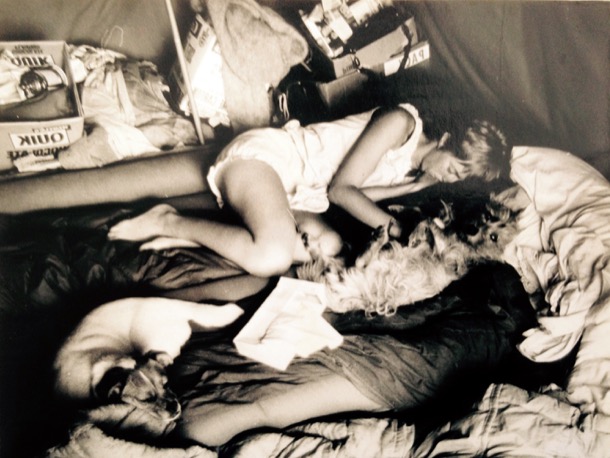
Inside the tent
Most of the time we were blissfully alone. However I remember lying naked in the river, hearing voices in the distance and being invaded by a scout troop on a canoeing expedition. I remember my acute embarrassment, lying in the all too shallow river. There was pointing and laughter from the scouts and unsympathetic mirth from my companions.
One night we drove to Corryong to have dinner. Afterwards, in the dark, perhaps a little drunk, we found our way back along the farm tracks, hiked through the bush and waded across the river back to our camp. We had torches, but in those pre LED days, torches were dim affairs which barely gave any light.
My exam results came out during that week and a simultaneous announcement of tertiary placements. This involved buying the Age newspaper and looking up your name. Once again we made the trek out to the car and drove to town. I was full of trepidation. How could such a distracted year and so little work end up with a place at Monash? Somehow it did. I was offered place in Monash Arts and a studentship.
Sue:
Our last trip together to the mountains was a year later, in January 1970. A very different experience but we followed our established pattern of the now many trips up here. We were on our way from Corryong to Khancoban all packed together in Rikki’s grey Beetle. In this small car we managed to pack four adults, two dogs, camping supplies and food. Unbelievable! It was very hot and the grass was straw coloured against a blue, blue sky when around the bend on the wrong side of the road came a car, driven by a worker from Snowy Hydro: a head-on in a rear-engined Volkswagen. We were very lucky.
Unhurt except for bumps on the head and a substantial coating of flour from an open packet in the food box we stumbled out of the car which was undrivable but only slightly damaged.
We did not get to the mountains, but we did get to stay with Elyne Mitchell at Towong Hill for two days, dogs and all. Mrs Mitchell happened to be driving past, saw the accident scene and took us in. With all our goods and chattels now in Mrs Mitchell’s Landcruiser, we drove back towards Corryong, but this time took the turn off to ‘Towong Hill’. We had so often passed the turn off, wondering about the house, hidden by large trees at the end of the small dirt road.
It was a marvellous experience, staying in that big old house, a large two story brick house, built in 1904, even though Mrs Mitchell was a slightly forbidding and austere presence.
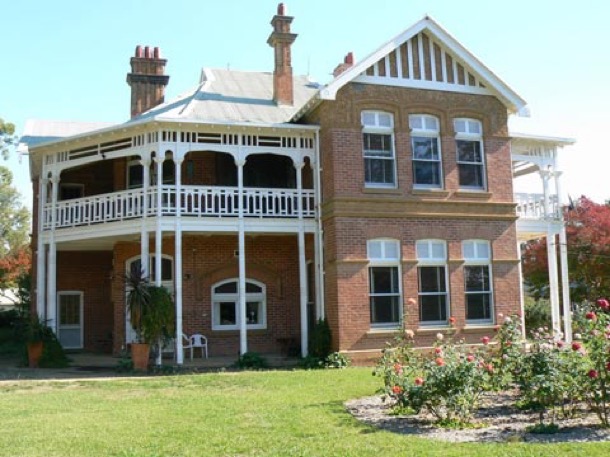
Towong Hill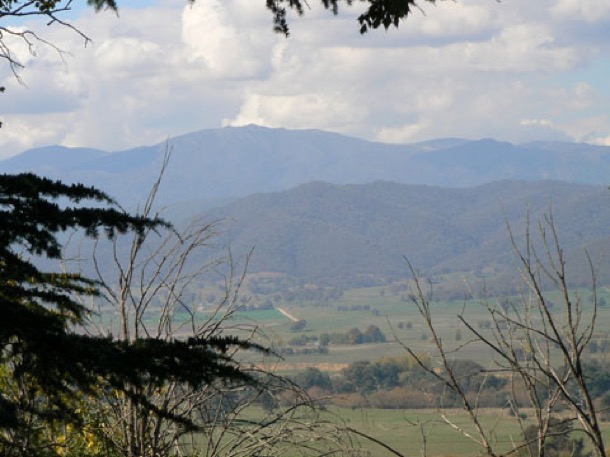
View from the house
We stayed upstairs in four of the many bedrooms. I remember white sheets and dark furniture and curtains blowing in the breeze. It was dark and cool downstairs, when we came down to breakfast the next morning. All the meals were served in the large formal dining room adjacent to a huge country kitchen. I remember Mrs Mitchell had biscuits, fresh tomatoes and herbs for lunch. No wonder she cut such a lean athletic figure.
After we had been introduced to the many lovely farm dogs and seen the horses and stables, Mrs Mitchell suggested that a swim might be beneficial for our aches and pains. We drove down the hill to the river flats and the Mitchell's favourite swimming hole in a billabong of the Murray River. Bliss! It was still quite hot.
A last dinner in this world away and then the long drive back to reality. Fred’s brother Phillip was picking us up in the morning.
We did not realise at the time that we would not go to Albina Hut together again. Somehow that accident fractured the foursome but the friendships formed were to continue in a different forms for each of us.

